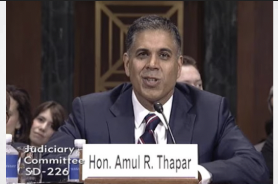Reuters
Conservative US judge pushes yanking law school funding until ‘originalism’ taught
Oct 24 (Reuters) – A conservative federal appeals court judge argued that donors and taxpayers should reconsider their financial support of law schools unless they hire more scholars who embrace “originalism” and better equip lawyers to argue cases based on the legal doctrine, which many Republican-appointed judges like himself favor.
U.S. Circuit Judge Amul Thapar, an appointee of Republican former President Donald Trump on the Cincinnati-based 6th U.S. Circuit Court of Appeals, lambasted the lack of conservative legal thinking in law schools during a speech late Wednesday, opens new tab in Washington hosted by the Heritage Foundation.
“Make no mistake: money talks,” Thapar said. “Only when the taxpayers and donors alike demand it will law schools start to change. When law schools do change, the hefty price paid for a law degree might actually be worth it because lawyers will leave law school equipped to practice in today’s courts.”
The speech marked the latest instance of Republican-appointed judges arguing for actions to address what they say is as an atmosphere on campuses that muffles conservative legal thought, following moves to boycott hiring law clerks from certain law schools.
Thapar, who had been on Trump’s short-list for possible U.S. Supreme Court nominees, and recently authored an admiring book about conservative Supreme Court Justice Clarence Thomas, argued law schools are doing their students a disservice by “failing to teach the prevailing method of constitutional interpretation.”
That judicial philosophy, originalism, seeks to interpret the U.S. Constitution based on its written text as understood at the time of its drafting in the 18th century and has been relied upon by the 6-3 conservative U.S. Supreme Court in recent rulings expanding gun rights and curtailing the right to abortion.
He said too often schools are teaching students “postmodern philosophy, critical theory and the need to abolish the carceral state,” and that professors “focus too little on understanding cases on their own terms and too much on what political considerations are supposedly motivating a court’s opinion.”
“So when a court employs originalism the professors instinctively misconstrue it,” Thapar said. “Surely, they tell their students, the court’s originalist analysis is just a smoke screen for some nefarious political goal.”
He said the lack of practical teaching law students receive about how to argue cases before judges like himself who embrace originalism are doing a disservice to overworked trial court judges who would hire them as clerks and to future clients who may hire them as lawyers.
He said donors should reconsider their support to law schools “unless institutions show genuine commitment to intellectual diversity,” including by hiring more scholars who teach originalist theory.
Thapar said to the extent law schools receive government funding, taxpayers should themselves demand change to ensure law professors are not “pursuing their own political agendas” but “producing something of practical value.”





